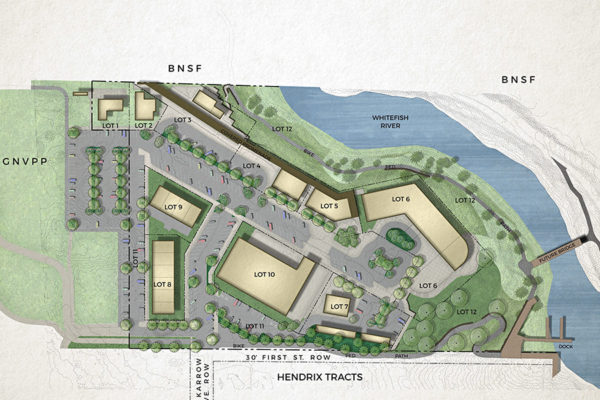Developer Defends Land Deal Linking Zinke to Halliburton Chief
As critics pounce, Interior Secretary denies wrongdoing while local real estate attorney says concerns over deal should be focused elsewhere
By Tristan Scott
Reports of a Whitefish real estate project linking Interior Secretary Ryan Zinke to the former head and board chairman of oil-services behemoth Halliburton have seeded yet another cloud of suspicion over Montana’s homegrown cabinet official, prompting ranking House Democrats to call for an ethics investigation even as sources close to the land deal say any suggestion of unscrupulous behavior is exaggerated and “patently false.”
The connection, first reported by Politico, draws parallels between Whitefish’s Ryan Zinke, the former Republican Congressman and state legislator whose rapid acceleration through the political pecking order landed him a plum cabinet position in the Trump administration, and David Lesar, a top executive at the global oil services giant Halliburton who is financially backing a mixed-use development project on a former industrial site near downtown Whitefish.
The Politico report published last week focuses on Lesar’s real estate interests in 95 Karrow LLC, the project seeking to revitalize a shuttered timber plant, and the Great Northern Veterans Peace Park, an adjacent land parcel with which Zinke has long ties. Although still undeveloped, Zinke has been promoting the park as a future site for a public sledding hill and skating pond since BNSF Railway donated the land to his Great Northern Veterans Peace Park Foundation a decade ago.
Now, in a shared-use agreement, the Foundation has agreed to allow 95 Karrow LLC and its developer, Casey Malmquist, to construct a shared parking lot on a portion of the park property.
According to documents provided by the Interior Secretary’s office, Zinke resigned from the family foundation in March of 2017. Still, his relationship with the chairman of an energy services company that stands to benefit from the agency Zinke helms has cast a pall of impropriety over an administration that has been heavily scrutinized for alleged ethical indiscretions and has been the subject of separate investigations.
In a statement from his office, Zinke said he’s no longer president of the park foundation or a board member. The foundation’s 2018 annual report listing him as an officer, as reported in Politico, was an error, Zinke said, and the foundation’s attorneys have since corrected it.
Sean Frampton, an attorney representing the Great Northern Peace Park Foundation, said Zinke’s name should have been removed from the annual report in April 2018, but remained due to a clerical error.
“Annual reports for the State of Montana are renewed electronically and our office renews several hundred annual reports each year, including this company’s annual report,” Frampton wrote in an email to Zinke’s office on June 19, after Politico published its report. “In April 2018, GNVPPF, Inc.’s annual report was renewed but Mr. Zinke was inadvertently not removed as a Director. My office has corrected this oversight today and the public record now accurately reflects the board composition. I apologize for any confusion.”
Zinke’s associates and family members continue to serve on the foundation’s board, however, including his wife, Lola.
The connection has prompted ranking U.S. House Democrats led by Rep. Raul Grijalva of Arizona to formally request Interior Department Inspector General Mary Kendall to examine whether Zinke was using his office for personal financial gain.
In a letter, the Democrats released exchanges between Zinke and Malmquist, the general manager of SmartLam, a cross-laminated timber manufacturer based in Columbia Falls and a prominent Whitefish developer leading the 95 Karrow project, who says he reached out to Zinke in an effort to better understand his future vision for the adjacent park.

In an interview with the Beacon, Malmquist said his relationship with Lesar dates back nearly two decades, to when he built the Halliburton executive’s home near Lion Mountain. Since then, Lesar has invested in several development projects led by Malmquist. The developer dispelled any narrative that his or Lesar’s financial stake in the project and their negotiations with Zinke were unscrupulous or intended to curry favors for Halliburton, nor did Zinke express any interest in the project’s potential to boost his property values or lead to future business investments, according to Malmquist. The property has long been eyed for development.
“We have a shared-use agreement to build a parking lot that we are paying for and it benefits both the peace park and our project. That is a very common development scheme,” Malmquist said. “There’s no money exchanged and no financial favors. Halliburton has never, ever come up in the discussions ever.”
“They literally have made a mountain out of a sled hill,” he said of the national reports.
According to the letter by the House Democrats, Zinke stands to benefit from the fate of the property adjacent to the foundation’s land, including 95 Karrow’s proposal to build boutique shops, a hotel and a microbrewery, a proposal Zinke made more than a half-decade ago but which never gained traction with surrounding neighborhoods.
“The American people must be able to trust that Department of the Interior decisions that affect the nation’s welfare on a daily basis are not compromised by individual self-enrichment,” the letter states.
Meanwhile, the watchdog group Public Citizens is calling for its own investigation, saying a public servant like Zinke, whose regulatory oversight influences uses on millions of acres of energy-abundant federal land, is violating ethical standards by maintaining business ties to an oil executive with a keen financial motive.
According to Interior Spokeswoman Heather Swift, Zinke has operated in accordance with all federal ethics guidelines.
“Mr. Malmquist sent the email to the Secretary because Malmquist sought background information and institutional knowledge about the GNVPP site that only the Secretary had. The two gentlemen talked on the Secretary’s personal time about the history of the site, previous studies, promised access and uses of the park, and the work that had gone into the park up to the point of the Secretary’s resignation,” Swift wrote in an email. “The Secretary adheres to all applicable laws, rules and regulations. He goes above and beyond mere technical compliance and strives for full transparency. Out of an abundance of caution and with an emphasis on full transparency, he forwarded the email to his work account because he knows all emails on the account are subject to [the Freedom of Information Act] and are publicly available.”
Chris Saeger, executive director of the Western Values Project, a public lands watchdog group and a frequent critic of Zinke’s policy decisions, including the agency’s move to shrink national monuments and increase opportunities for oil and gas exploration, said an arrangement between a public official like Zinke and an oilman who stands to benefit from the agency that regulates oil and gas drilling on millions of acres of federal land is an obvious red flag and presents potential conflicts of interest that cannot be ignored.
“At best, Ryan Zinke’s foundation allowing a Halliburton-backed developer to exploit land set aside for public use for private gain looks bad,” Saeger wrote in an email. “At worst, it’s probably illegal. Although Secretary Zinke is claiming this sweetheart deal is not a departmental matter, how can he have this close relationship with a former executive of a multinational oil company and ethically oversee oil and gas drilling decisions on public lands at the same time?”
A local real estate attorney who spoke to the Beacon on the condition of anonymity said a larger point of concern involves the legal implications of a nonprofit foundation handing over land designated for public use to a commercial development.
“That’s illegal under 501C3 IRS regulations, and it’s vitiating the purpose that the park was supposed to serve,” the attorney said. “The fact that his family members are serving on this nonprofit as directors and board members and are granting a parking easement for a commercial purpose should raise the IRS’ red flags and they should audit this organization.”